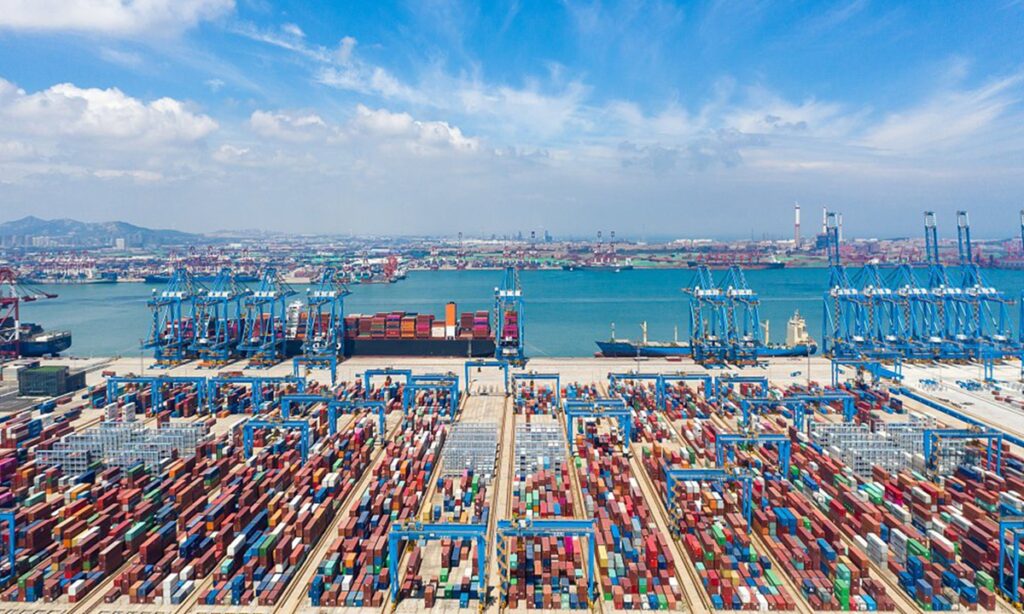As the global economic and trade landscape has taken a hit from challenges and shocks, it seems that China-Germany trade relations are also undergoing changes as a result of geopolitical tensions and industry chain restructuring, but these factors won’t alter the long-term trend of bilateral trade.
China could lose its position as Germany’s most important trading partner to the US this year, the German newspaper Die Welt reported on Sunday. It quoted a report by Germany Trade and Invest that “China’s dominant position in foreign trade with Germany is collapsing,” as both the country’s exports to and imports from China recorded significant declines last year.
In 2023, bilateral trade between China and Germany reached $206.78 billion, down 8.7 percent year-on-year. China’s exports to Germany decreased 13 percent to $100.57 billion, while imports fell 4.2 percent to $106.21 billion, according to data from Chinese customs.
While some European politicians may see the decline in China-Germany trade as an achievement of the so-called “de-risking” push from China, what it really represents is that Germany’s economic performance has significantly lagged behind others over the past year.
One of the main reasons for the trade decline is the contraction of the German economy, which has become a major drag on the demand for Chinese imports.
In 2023, Germany’s GDP shrank by 0.3 percent due to persistent inflation, high energy prices and weak foreign demand, according to the Federal Statistics Office. It was predicted to be the only member of the Group of Seven to record an economic contraction last year, according to IMF.
Moreover, global economic growth was sluggish in 2023 amid geopolitical tensions, growing debt problems and widespread economic bearishness. Global trade is estimated to have fallen 5 percent from 2022’s record level to less than $31 trillion, according to UNCTAD’s latest Global Trade Update.
As a result, Germany’s trade with its major partners fell sharply, with exports to the US down by 9.9 percent and exports to China down by 12.7 percent in December.
Also, since the US has been pressuring Chinese manufacturing through unprecedented means like “decoupling,” the restructuring of global industry and trade chains is affecting China-Germany trade. Some German politicians, on the grounds of “national security,” have emphasized the concept of “de-risking” when it comes to trade and economic issues with China, so as to reduce “economic dependence” on China.
Even though the global economic slowdown and an ideology-based approach to China policy may bring some volatility into China-German trade relations in the short term, they won’t fundamentally change the momentum of bilateral economic ties.
The 2023/24 Business Confidence Survey released last week by the German Chamber of Commerce in China showed that despite multiple headwinds and uncertainties dimming China’s appeal as an investment destination, 91 percent of German businesses plan to continue doing business in China. Their attitude of being unwilling to give up the Chinese market shows why businesses on both sides should retain confidence in bilateral cooperation.
China-Germany economic and trade relations have a profound historical foundation and realistic strategic significance. Industry chains in both countries have been closely intertwined for many years. For instance, a representative Bundesbank survey found that nearly half of the companies in the manufacturing sector directly or indirectly source critical intermediate inputs from China.
German sectors like vehicles, mechanical engineering, electronics and electrical engineering are significantly reliant on Chinese demand.
It’s neither necessary nor appropriate for Germany to bet against relations with China in the face of global economic challenges, which just shows their lack of confidence in their economy. This is because Germany is an export-oriented industrialized country, and a weakening relationship with one of its major trading partners can be detrimental to its own economic recovery.
China has a colossal consumer market, stable industry and supply chains, and an ever-improving business environment. Despite economic challenges, the Chinese government has announced policies to boost domestic demand.
What China-Germany trade needs is not pessimistic sentiment, but stronger cooperation to find breakthrough for further deepening cooperation to overcome their challenges.
(Global Times)




